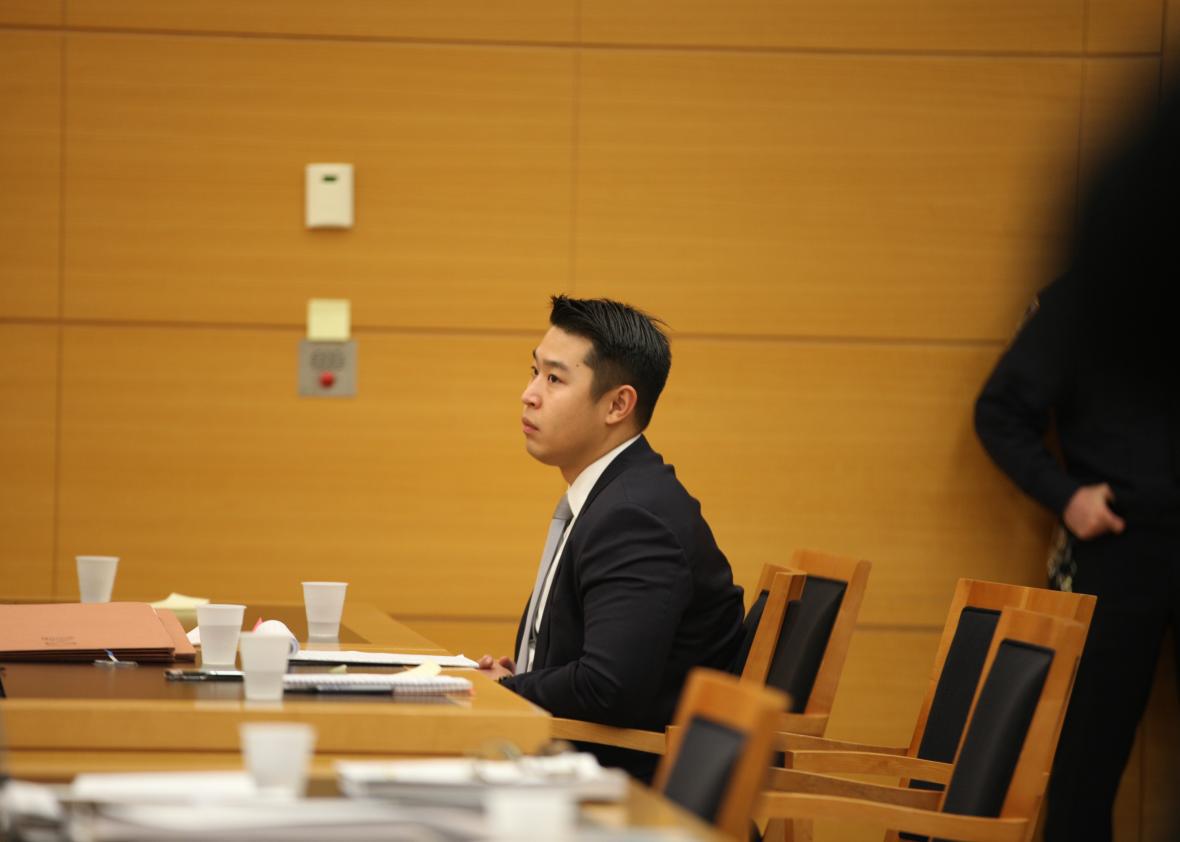Brooklyn District Attorney Ken Thompson is recommending that former NYPD officer Peter Liang, who was found guilty of manslaughter earlier in February for fatally shooting an unarmed black man in a public housing stairwell, should not face any prison time.
In a letter to the Brooklyn judge who will preside over Liang’s sentencing, Thompson said Liang’s punishment for killing 28-year-old Akai Gurley should be five years of probation, six months of house arrest, and 500 hours of community service.
“Because the incarceration of the defendant is not necessary to protect the public, and because of the unique circumstances of this case, the People do not believe that a prison sentence is warranted,” Thompson wrote in his letter.
Liang’s conviction was an extraordinary event, and a moment of reckoning for the Black Lives Matter movement. For once, it seemed, a police officer who had killed an unarmed black person was being held criminally accountable for his actions.
But beneath the surface, the case did not quite fit the narrative of a civil rights victory. Liang had shot Gurley by accident, not on purpose; in fact, Liang didn’t even see Gurley until after he realized that the bullet that came out of his gun had ricocheted off a wall and struck Gurley in the chest. This was not Darren Wilson in Ferguson deciding that Michael Brown was a deadly threat and shooting him, he says, in order to protect himself. This was not Michael Slager in Charleston deliberately shooting Walter Scott in the back as he fled. This was a rookie cop having his gun out and his finger on the trigger while on patrol, and firing without meaning to when he heard a loud noise. Liang was bad at his job, and his mistake cost an innocent man his life. But the fact that he might not serve any prison time for it should not enrage anyone.
There are those who believe Liang was convicted because he was Asian—that at a moment of intense national tension over police misconduct against black people, he served as a convenient scapegoat for a system that has gone out of its way, over and over, to protect white police officers. I don’t know if that’s true. Maybe it is. But it’s important to keep in mind that, when it comes to police officers doing terrible things, an accident is much harder to defend against a criminal charge than a conscious, tactical decision. In the latter case, a police officer can always argue that he acted reasonably—that he feared for his life, and acted accordingly, as many of his colleagues would have when faced with the same situation. That defense tends to work. But in the case of an accidental discharge, what can you really say when you’re charged, as Liang was, with manslaughter in the second degree? The penal code in New York defines that crime as recklessly causing the death of another person; whether you’re a police officer or not, shooting someone by accident because you were doing something you weren’t supposed to be doing pretty neatly fits the bill.
Of course, plenty of people go to prison for manslaughter, and there’s no reason Liang’s status as a cop should mean that he doesn’t. But if you’re a person who believes the criminal justice system punishes too many people too harshly, and puts too many of them behind bars for too many years, ask yourself: Would it be such a terrible thing if Liang was spared that fate, even if it was because he was getting special treatment as an ex-cop? Would prison time for an accidental shooting really reduce the likelihood of the next Michael Brown or Walter Scott being killed—and isn’t that the primary desired outcome of the upheaval the country is currently going through?
The number of police officers who were charged with manslaughter or murder as a result of on-duty shootings last year was at least 17. According to research by Philip Stinson, a criminologist at Bowling Green State University, that represented a massive spike compared to previous years: between 2005 and 2014, the United States saw an average of just five officers per year facing such charges. Though it’s unwise to draw too many conclusions from just one year’s worth of data, it seems to me that, whether Peter Liang goes to prison or not, the political climate surrounding police violence has already shifted dramatically. That, more than anything, is what’s going to drive down the number of people who die at the hands of law enforcement.
